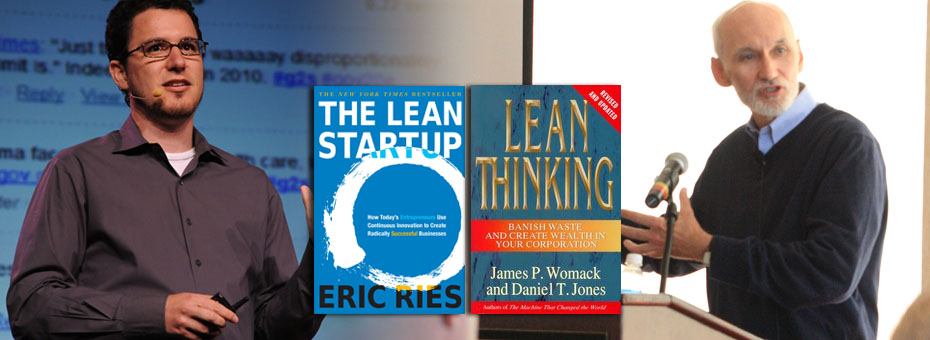On November 18th, Lean Enterprise Institute CEO and author of Managing to Learn John Shook participated in a pre-Lean Startup conference webcast, “Putting the Lean in Lean Startup” with The Lean Startup author Eric Ries. Read on for key insights and highlights from Shook and Ries below.
John Shook on the decision to use the word “Lean” to describe the production system that Lean is:
“Is that the right word? Because [Lean] is a very holistic system, there’s a lot of richness in this way of working. Does Lean really capture that? It’s hard to say. But all it means–and I think this is very much in the spirit of what you’re doing with Lean Startup–all we’re doing is taking customer needed value and understanding how we can produce that, provide that, create that with minimum resources through teams, through people engaged in doing the work in ways that [create] continuous innovation… and solving problems in their own work every day, all the time. Quick cycles of learning.”
Eric Ries on his decision to use the word Lean in describing the Lean Startup:
“[Lean] already existed before there was Lean Startup. And Lean Startup was just the most accurate way to describe the philosophy that we espouse—namely the application of lean principles to the context of entrepreneurship or a startup situation, a situation of high uncertainty.
One of our missions in the Lean Startup conference is to try to bridge these two communities. For those of you who are my followers, you may not be familiar that there’s this much broader lean world out there. And I hope we have people tuning into the webcast who are some of John’s followers who may not be so familiar with the startup part of Lean Startup… We have these two very excited, very passionate communities, and I hope we can bring them together.”
John Shook on lean management, in response to a question about what to do when the challenge with an organization’s lean transformation is with management, not the workers:
“First of all, [the problem is] always the managers and not the workers… If we are the leaders, we have to look in the mirror… People often ask, where do you start? Do you start at the top, in the middle, on the frontlines? But honestly, wherever you start, the other areas are going to be the problem… What we have to do is flip some things on their head in terms of who’s responsible for what. Managers who think the old command and control paradigms will work quickly find out they don’t, so nowadays command and control is quite discredited. But honestly, what is offered up in its place? It’s often some sort of laissez faire, ‘let’s just manage by ROI, let the numbers tell us what to do’ [model], and that’s no better. Managers have to become engaged and first and foremost decide that ‘change begins with me, I have to learn first, my job is not to get other people to change, my job is to change.’ It’s one of those old junior high sports cliché things, but it’s true. The only thing you can change is yourself… Management does matter. What are the management processes we can put in place so people are being developed to find problems and improve their work and innovate on behalf of the customer?”
Eric Ries on management and entrepreneurship:
“One of the things people find so counterintuitive, certainly in the Lean Startup community, is I think about management constantly… I try to convince people entrepreneurship is management. Because an entrepreneur’s startup is not just an idea, not just a product; it’s a group of people who have to [work together]. So that’s management, no matter what you call it. I really believe in ‘entrepreneurial management’, the management discipline that deals with situations of high uncertainty.”
You can also read a great recap of the webcast by Lisa Regan, a writer for the The Lean Startup conference, here.



